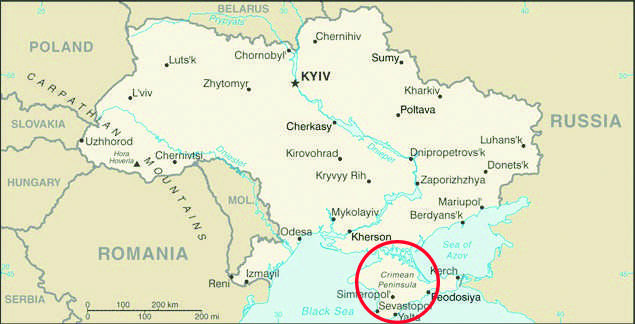War with Russia is not the answer
Indicated in red is the Crimean peninsula, the contested area of land on the southern coast of Ukraine.
Tension has been building between the U.S. and Russia in recent months, leading many to wonder if conflict between these two nuclear-armed nations could come to blows.
Vladimir Putin, the Russian prime minister, has made many decisions that clash with U.S. standards for democracy. For one thing, Putin granted asylum to Edward Snowden, a man wanted by the U.S. for leaking classified government information.
What is also concerning is that Putin has been known to squash his critics by either jailing them or sending them out of the country.
Putin’s most damning decision in the eyes of Western leaders was to send troops into western Ukraine under the pretense of controlling the 2014 Ukrainian Revolution after they ousted their president.
There is no excuse for Putin’s conduct. He was President of Russia from 2000 to 2008, and the fact that he is now serving a third term is just another indicator that his administration has become increasingly dictatorial.
This February marks the anniversary of Putin’s first intervention in Ukraine. Throughout the past year, the violence between pro-Russian separatists and Ukrainian civilians has only escalated.
At this point, Russians are attacking towns in eastern Ukraine on a daily basis. This month the U.N. refugee agency reported that close to a million people have been displaced by the conflict.
Due to the increase in violence in the eastern provinces, infrastructure and basic health services have fallen apart. The town of Debaltseve has experienced the brunt of the violence. Its inhabitants are dependent on foreign assistance and live in constant fear of shellings and rocket attacks.
A large part of the current conflict is over Crimea, a peninsula on the southern coast of Ukraine that extends into the Black Sea. Throughout history, Crimea has been fought over by rulers because of its ideal location between central and eastern Europe.
History is repeating itself today as Putin and Ukrainian president Petro Poroshenko fight over the coveted Crimean peninsula.
The Russian government reported that a referendum of Crimeans citizens last March indicated that 96 percent of Crimeans are in favor of annexation, or in other words officially becoming part of Russia.
As I read about this, I immediately became skeptical of this landslide result. As it turns out, I am not the only skeptic. Surprisingly, the Russian government has an official Human Rights Council that regularly criticizes and exposes their government’s civil rights issues.
After the results of the referendum came out, the Human Rights Council reported that at most, only 30 percent of Crimeans even showed up to vote for this referendum. More importantly, in this sample of the Crimean population, the divide between proponents and opponents of annexation is more evenly split.
It is important to know that this Council is one of the few government agencies in Russia that openly criticizes Putin and his bureaucracy. Unfortunately, some of the liberal members of this Council have recently resigned or have been “forced out”.
It is undeniable that the Ukrainian and Russian cultures are closely connected, especially since Ukraine only became its own country a little over two decades ago in 1991. Crimea in particular has many citizens that ethnically identify as Russian.
The way I see it, the conflicts happening between Ukraine and Russia are meant to be solved by the two parties involved.
I was happy to hear that last week, Presidents Poroshenko and Putin seem to finally be coming to an accord. On Feb. 12, four European leaders — German Chancellor Angela Merkel, French President Francois Hollande, Poroshenko and Putin — convened in Minsk, Belarus, and signed a Ukrainian cease-fire agreement.
After 17 hours of negotiation, it was agreed that the cease-fire between Ukrainian and Russian forces would take place on Feb. 15.
The city of Minsk is the same location where previous accords involving Ukraine have been determined. Historically, these have had less than satisfactory results. Hopefully the latest agreement will prove more effective than the previous ones.
I am confident that Ukraine’s European neighbors will be able to provide more than enough support in this difficult time of transition.
History has the tendency of repeating itself, but it can also serve as a cautionary tale. It is my hope that in this century, European leaders will not simply appease the bully on the block, as they did with Nazi Germany, but instead learn to lay down the law.
The economic sanctions we have thus far imposed on Russia are good examples of how nations are able to stand up to an opponent without breaking out the bombs.
The U.S.-imposed economic sanctions on Russia are a viable method of deterring them from invading Ukraine, but military force is not. American intervention in foreign conflicts is not always beneficial to the war-torn nation.
We mean well by offering to help, but I doubt Ukrainians would welcome the idea of the U.S. planting a stake in their country’s future. Our unsavory reputation precedes us.
I can see why the U.S. might be tempted to intervene in this European conflict to prevent a larger war from starting. The idea of extinguishing a relatively contained conflict between Ukraine and Russia is more palatable than the prospect of all-out nuclear war with Russia.
However, every country inevitably hits a few speed bumps as it develops. Ukraine has been officially independent from Russia for only 24 years, so it should expect to face a few difficulties on its path to maturity.
In our own nation, we have experienced significant transformations: the Revolutionary and Civil Wars, various civil rights movements and immigration reforms.
Many of us have older siblings who like to boss us around and make decisions for us. As a young sibling myself, I know when to take my older siblings’ advice, but I also know that I internalize and learn from my experiences when I make my own calls.
If Ukraine is ever to become an independently-functioning sovereign nation, it needs to be able to make its own decisions.
In other words, now is not the time for the U.S. to intervene by arming Ukraine and sending them lethal weapons. During a press conference on Feb. 9, Obama hinted that this plan of action could be an option if Russia continues to terrorize Ukraine.
“We continue to encourage a diplomatic resolution on this issue,” Obama said. “…the 21st century cannot stand idle and simply allow the borders of Europe to be redrawn at the barrel of a gun.”
President Obama, who was delivered a joint address at the White House with German Chancellor Merkel, emphasized that Western nations need to present a united front to Russia, which is a nation that is largely isolated from the rest of the world.
“When free people stand united, our interests and our values will ultimately prevail,” Obama said. “…we can end wars.”
What is the only thing better than ending a war? Never starting one in the first place.

Sarah Metzel is the current Editorals Editor of The A-Blast. She joined the staff sophomore year as a staff writer.
Metzel was accepted into the Young...





